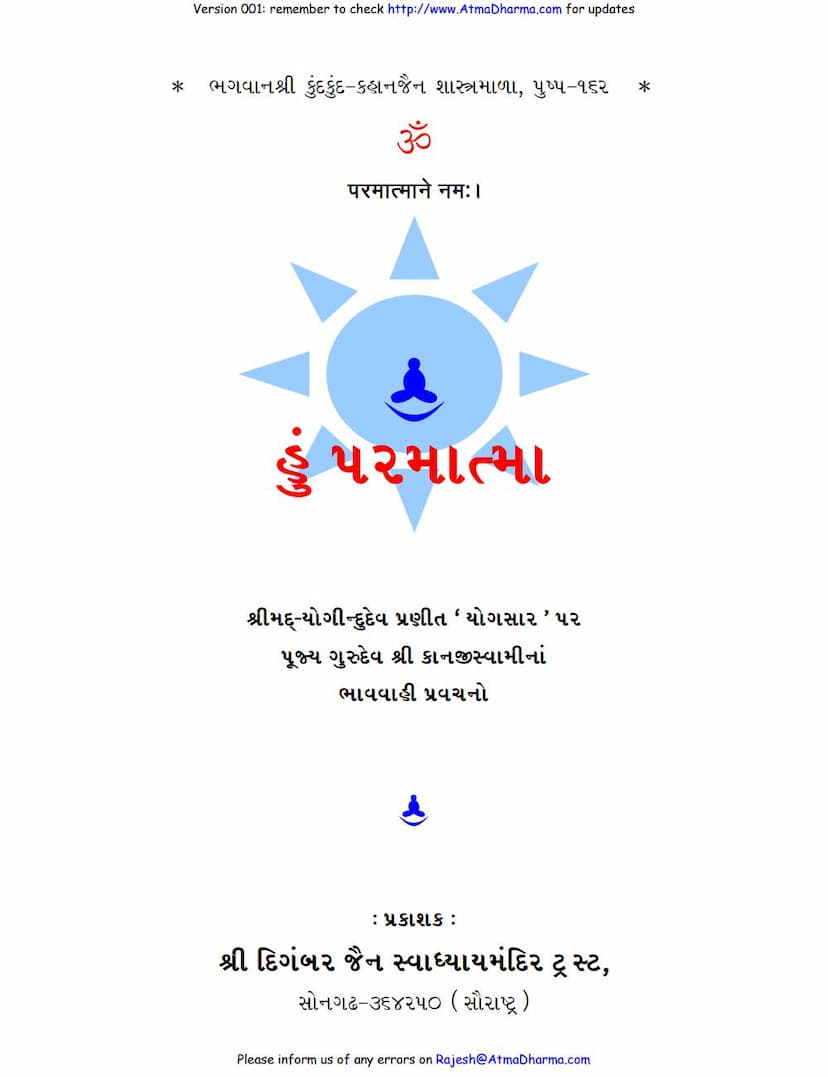Hoon Parmatma Choon
Added to library: September 1, 2025

Summary
Based on the provided text from "Hoon Parmatma Choon," which contains the discourses of Pujya Gurudev Shri Kanji Swami on Shri Yogindradev's "Yogsar," here's a comprehensive summary in English:
Book Title: Hoon Parmatma Choon (I am the Supreme Soul) Author: Pujya Gurudev Shri Kanji Swami (based on discourses on the text by Yogindradev) Publisher: Shri Digambar Jain Swadhyay Mandir Trust, Songadh
Core Theme:
The book, "Hoon Parmatma Choon," is a collection of discourses by Pujya Gurudev Shri Kanji Swami that expound upon the profound spiritual teachings found in the "Yogsar" text by the ancient Jain Acharya, Shri Yogindradev. The central theme is the realization of the true nature of the soul as the Supreme Soul ("Parmatma"). Gurudev Kanji Swami, through his simple yet profound discourses, aims to guide individuals towards this self-realization by elucidating the essence of Jain spiritual philosophy, particularly as presented in "Yogsar."
Key Concepts and Teachings:
The discourses emphasize the following core concepts:
- The True Nature of the Soul (Atman): The book consistently highlights that the soul is inherently pure, eternal, and blissful, possessing infinite knowledge, perception, strength, and bliss. It is described as a conscious entity, distinct from the body, mind, speech, karma, and all worldly possessions and experiences. The soul's true form is characterized by its inherent purity, consciousness, and blissfulness, free from any taint of karma or worldly attachments.
- The Goal of Spiritual Practice (Yoga): The "Yogsar" itself signifies the "essence of yoga," which is defined as the connection or union of the soul with its true, pure, and eternal self. This union is achieved through right faith (Samyak Darshan), right knowledge (Samyak Gyan), and right conduct (Samyak Charitra), ultimately leading to the realization of the soul's supreme nature as "Parmatma" (Supreme Soul).
- Identification with the True Self: A major focus is on dis-identifying with the transient and impure aspects of existence – the body, senses, emotions (like attachment and aversion, subtle attachments to religious practices), karma, and external worldly phenomena. The discourses stress that true identity lies solely in the soul's pure, unchanging essence.
- The Path to Liberation (Moksha): The discourses articulate a clear path to liberation, emphasizing:
- Discrimination (Bhed Gyan): Understanding the fundamental difference between the soul (Atman) and non-soul (Pudgal, Karma, etc.). This includes recognizing the soul's pure, conscious nature and distinguishing it from the impure, unconscious, and impermanent aspects of existence.
- Self-Attention (Antarmukh Drishti): The importance of turning one's attention inward, away from external sensory experiences and worldly attachments, to the inner realm of the soul.
- Self-Realization (Atmanubhav): The ultimate goal is to directly experience the soul's true nature, its inherent purity, bliss, and omniscience. This experiential realization is the key to liberation.
- Right Faith, Knowledge, and Conduct (Ratnatraya): These are presented as the means to achieve self-realization. Right faith involves unwavering belief in the soul's true nature, right knowledge is the accurate perception of the soul, and right conduct is living in accordance with this knowledge and faith, which eventually leads to the renunciation of all impure thoughts and actions.
- The Nature of Reality: The teachings delve into the Jain perspective on reality, emphasizing the distinction between the eternal, unchanging soul (Dravya) and its transient states or modifications (Paryaya). While the soul's true nature is pure and eternal, the current state of bondage involves impure modifications. The path to liberation involves understanding this distinction and focusing on the eternal, pure essence.
- The Role of Gurudev Kanji Swami: The book is a compilation of the discourses of Gurudev Kanji Swami, who is revered for his ability to explain complex spiritual truths in a simple, accessible manner. His discourses are noted for their devotional fervor and practical guidance towards self-realization. The emphasis is on the direct experience of the soul, rather than mere intellectual understanding.
- Rejection of External Ritualism without Inner Realization: The discourses consistently caution against relying solely on external rituals, austerities, or even scriptural knowledge without the inner transformation of self-realization. True spirituality lies in the inner experience of the soul, not in external performances.
- The Soul as God: A profound concept conveyed is that the soul, in its pure and realized state, is itself the Supreme Soul (Parmatma). The divine qualities are not external but inherent within the soul. The practice is to uncover and realize these inherent qualities.
Structure and Style:
The book presents the discourses of Gurudev Kanji Swami, likely transcribed from audio recordings. The language is accessible and aimed at spiritual seekers (mumukshus). The discourses often use analogies and simple explanations to convey deep philosophical concepts. The discourses are structured around verses or couplets from "Yogsar," with Gurudev's commentary and elucidation following each verse.
Overall Message:
"Hoon Parmatma Choon" serves as a guide to understanding and realizing the soul's divine nature. It encourages a profound inner exploration, emphasizing that the path to liberation is through self-awareness, detachment from the external, and deep contemplation of the soul's eternal, blissful, and pure essence. The book aims to awaken in the reader the conviction and experience of being the Supreme Soul, transcending the limitations of the physical body and worldly karma.